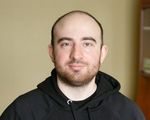About Success Builder
How do you find your place in life? How do you find something to do that both comes naturally to you and makes you happy? The answer is that you have to apply the knowledge you’ve gained from university and from life itself correctly. The Success Builder Project features HSE University graduates who have discovered themselves through an interesting business or an unexpected profession. The protagonists share their experiences and lessons learnt and talk about how they’ve made the most of the opportunities they were given.
Ernest Sadykov, a graduate of the HSE Faculty of Computer Science (FCS), works as a software engineer at Facebook. In this interview, he tells Success Builder how an extrovert can be a ‘techie, why companies have trouble finding IT specialists and what Facebook’s philosophy is.
Why did you choose to apply to the FCS? Did you just like sitting at the computer?
Even before software engineering was big, it seemed to me that HSE and the FCS embodied a healthy balance between technical depth and the human side of how that knowledge is applied. It turned out to be true. It seemed that HSE taught students how to be good people, how to work in a group, to understand what teamwork is, to make presentations and to stay relevant to the market. This was more to my liking than purely technical universities such as MIPT or MSU.
There is a common perception that ‘techies’ don’t need soft skills. Why was this human aspect of education important to you?
This is a misconception. Modern software development is a team effort and, with very few exceptions, you can’t accomplish anything without soft skills. I probably just guessed right that the social aspect is important and that, in addition to the main skills, you need to develop effective working communication, be outgoing and be able to convey ideas. And maybe I’m just afraid of being alone and so try to retain some kind of human contact. I like interacting with colleagues and, generally, feeling connected. Now I’m in an environment and a company that unites both of these things. I’m probably an extrovert: I love people — and technology.
You can’t be successful at Facebook if you are unable to cooperate and coordinate with others. That’s why the company pays a lot of attention to communication skills when they interview potential employees. People who are awesome programmers but don’t know how or don’t want to communicate are often eliminated at this stage.
Do think HSE was easier to get into than a technical university?
If I had applied to the Software Engineering programme a couple of years later, I probably wouldn’t have gotten in. I was accepted thanks to my scores in the Academic Olympics in computer science. However, my Unified State Exam scores would also have done the job because I had been preparing hard for them for a year and a half. I definitely wouldn’t have gotten into MIPT because I never had a focus on physics. I leaned more towards the social and applied side of things.
Did you find what you had been expecting at HSE University?
Yes. First, I got freedom and realised how important it is. I came to Moscow from a small city where I studied at an ordinary, Soviet-style regional school. When you come to HSE from such a conservative place, you are literally blown away by how much you are treated as an adult, how much you are trusted and viewed as independent and full of initiative — and you aren’t punished for this in any way. You get what you dreamed of — that is, you are finally seen as an independent person. And even more importantly, you find yourself surrounded by very interesting people. I am still friends with fellow students from other faculties. HSE gave me a new and very cool environment.
During which year of your studies did you finally feel like an adult, and was it connected in some way with a job?
I never felt a clear transition into ‘adulthood’. Of course, moving to Moscow made me more independent, but I still felt like the same person. The whole thing was rather painless: I had loved Moscow since childhood and was very happy to finally move there.
I graduated from the FCS in 2015. That faculty has changed a lot since then and is closely connected with Yandex. It has become easier in terms of career, knowing what you will do later and how you will earn a living. But back then, it wasn’t obvious for me where I should go after university. I had to make an effort, prepare for interviews and choose.
My teachers were very supportive. They gave me advice regarding vacancies and internships and consulted with acquaintances who were already specialists at this or that company. Mandatory internships also gave me an understanding of the profession, mostly by showing me what I definitely would not want to do.
First, I tried my hand as a system integrator where I wrote code and documentation, made some presentations and worked in an office. By my fourth year at HSE, I was already working full-time in a company that did SEO optimisation. I started as a part-time iOS programmer during my second year of studies. I switched over to backend development fairly quickly and I’ve stayed there ever since. Working and supporting yourself probably marks the stage of formally becoming an adult.
As a technical specialist, is it easy to find high-paying jobs where you can work remotely?
I hate working remotely! But yes, it’s true. Still, it’s not easy to get a job right after graduating: nobody’s chasing you down to hire you.
The job search is easier if you’re really driven—not by money and fame, but by the process itself.
There are definitely more funds in IT now than in any other industry. If you take into account the amount of stress, the work-life balance and the money, I’m certain that programming is an ideal profession and that there is no better time for it than now.
Is there a lot of competition in the market for technical specialists? We often hear about staff shortages with companies drowning in data.
The market is growing very quickly and people are constantly finding new ways to automate and apply machine learning. Somebody has to do all that. But a problem arises when you, now as an employer, begin interviewing people for technical jobs: it is very difficult to choose the necessary specialist from among this flood of résumés and interviews. Most of the candidates don’t quite fit your vision for carrying out the required tasks.
At my various jobs, at some point, I always had to start conducting interviews, and it was often a depressing experience. This is because I always saw a disconnect between the company’s values and the candidate’s goals: the high demand had spoiled the techies, making it very difficult to find a person who would fit in and really apply himself or herself to the work.
It sounds funny, but a lot of people who interview for programming jobs don’t know how to code
Some people just twiddle their thumbs at work and then suddenly decide that they need to advance their careers. Then they apply to your project. When you ask them to write some code, it really knocks them for a loop. ‘Oh, God – you mean actually do something?!’ Although they only need basic skills, they have managed to avoid gaining even those because, in this overheated market, everyone can get a job. This has lowered the bar of professionalism.
This is not even to mention personal development. That is a big and complicated story because technical specialists have a tradition of not worrying about communication skills and various soft skills. There a lot of people who are really great, but who don’t place any importance on the human side of the job, on anything outside of their strictly technical responsibilities. When talking to such a candidate, it is hard to believe that this person would be able to work in your team.
Why did you switch companies if you were happy with every aspect of your job?
Because I myself am changing and looking for something new. I don’t have a vision of where I would like to be in 10 years. After working with iOS programming, I realised that I didn’t want to make apps anymore and that I wanted to do backend work, server programming. I went to another company, but the work was boring. I was invited to a third company and went there because it offered new technical challenges, development processes and people from whom I could learn. Then I decided that I’d also like to try working at Yandex.
I really enjoyed working at Agoda in Bangkok. I was a team leader. I had to coordinate many teams and work with people, but I also had to write code and create architecture. Then I spent some time doing freelance projects with American companies while also studying for a master’s degree in Italy, where it turned out to be not so easy to find work without knowing the language, and where the locals can navigate the bureaucracy better than other Europeans can. For a long time, I’ve wanted to work at a FAANG [Facebook, Amazon, Apple, Netflix and Google — Ed.] company. They are like Yandex, but on a much larger scale, and with much more demanding technical challenges. I also wanted a job with one of these companies as a way to move to London.
Yandex is also a very interesting career option. Why didn’t you want to grow there?
I had a great manager and team with whom I still stay in touch. It really is possible to grow there. You could call Yandex a good school that has lots of teams, users, servers and engineers — and everything is very large. That experience definitely builds your professionalism. But I wanted to leave Russia for ideological and political reasons and to work for a global company.
How did you manage to study at the Polytechnic University of Milan? And most importantly — why did you study there?
After working as a team leader, I realised that there were areas in which I was not as good as I would have liked. HSE gives you everything you need to get started in your profession, but in technology, you need to move on to new levels constantly. At that time, I was working on distributed systems, where you have lots of data and users. The computer can’t cope with the load, so it must be distributed to dozens, even hundreds of other computers. I was desperately short on knowledge in this area.
No matter which company you join, be it Yandex or Agoda, you encounter a new range of problems. My need for concrete skills coincided with my stay in Milan, where I found a good master’s programme in computer science where I could focus on distributed systems. I studied there for one semester, learned a lot, and understood that now I could study specific things I needed on my own. I didn’t really need the diploma, so after that, I took Coursera classes and other short courses with a very narrow focus that are useful for working in the IT industry.
Everything connected with technology is constantly changing, so is a university degree even necessary to work in IT?
It would be untrue to say that the university provides an ideal foundation. Knowing what I do now, I would go back and change a number of things. Still, that education provides a strong basis on which you can build later. Computer science is a relatively formal set of mathematical disciplines, many of which remain just as relevant now as they were 50 years ago.
Which aspects of the field are changing? What is popular and in demand right now that students will get with a university diploma?
Before talking about changes, you need to understand that software engineering and computer science are two very different fields. Computer science uses fundamental algorithms built on mathematics to solve the tasks that arise when using a PC, and taking into account computer architecture. In software engineering, your task is to not only know algorithms but also to be able to analyse problems, build software, assemble and manage a team, evaluate costs and deadlines, perform testing and provide documentation.
Back in 2006, HSE University decided to divide these two areas and develop them separately. In software engineering, new technologies are constantly appearing that you can use in projects. This means new methodologies are emerging that enable you to work faster, as well as new models of customer-contractor relations. The main thing is to understand that this principle of constant renewal and change is fundamental. Once you accept that, you are ready to constantly learn something new through practice or from other people’s projects. Concerning demand for certain specialists, I would simply say that there is work for everyone in the current IT market. You should do what it is you like.
How is the work of a software engineer different at Facebook?
For my specialisation, there is a standard position at Facebook — Software Engineer — with a few variations such as data analyst, machine learning engineer, etc. There is a whole philosophy as to what makes this work unique at Facebook. In this position, you can take on as much responsibility, coordination and leadership as you can handle. No project is too large. Managers monitor how the work is going and they, in turn, help you develop. They make sure you are satisfied with the work, communicating well with others and contributing to the global vision of where the team is going.
You don’t need to be a superman to work here. The procedure is very standard, and the company’s website states this. It’s good if an employee recommends you. Next comes a phone interview with a recruiter and a coding interview at which you need to perform a programming task in real time. Then, at a meeting in the office, they test your communication, programming and system design skills. Then comes the anxiety-filled and agonising waiting period.
As for visa issues, it all depends on the country in which that particular Facebook office is located. I work in London where the migration policy is fine. And after Brexit, we are now on equal footing with, for example, other Europeans.
What makes working at Facebook interesting in terms of the teams, the office itself and bonuses?
I’ve only been to the office once because I started working during the pandemic. Yeah, there are many interesting things there and the employees are well taken care of. It’s like a home environment with the food, drinks and entertainment. One important thing that really impressed me right away was how there are no organisational restrictions — what you can’t do and what you have to do. Oddly enough, the creative aspect is highly developed in the technological setting here: you articulate your ambitious desire, discuss with the manager just how crazy the idea really is, then you consult with him regarding the evaluation of the work and the final result. This pertains to the question of the need for soft skills.
If the team trusts you and you convince them to carry out the task in the way you envision, you can proceed without getting any sort of reprimand for it.
Taking the initiative is not a punishable offence and Facebook welcomes a non-standard approach
You are surrounded by very smart and capable people, and you sometimes catch yourself thinking how much more there is to learn. Just the fact that I am developing products used by billions of people really motivates me. This scale poses numerous technical challenges that are actually interesting to solve.
Why do you live in London if you could work remotely from anywhere?
My wife and I moved from Italy to London in August 2020 because we have always loved this city. It was even good during the lockdown. We managed to go to outdoor restaurants for a month and a half before they were closed again, but that’s alright. London is very diverse and has lots of immigrants, so you feel like it’s your home from the moment you arrive. It has the right kind of medical system and the state has elements of ‘soft’ socialism. It’s beautiful and accommodating. We have lots of friends and even some relatives here.
What types of things do you do in your job?
There are two main types of software engineering jobs at Facebook. One includes the product teams that create solutions and do the programming that gives users a certain type of news feed and new features in Messenger and buttons in Marketplace. The second involves infrastructure teams that provide the context for the product teams. I work in infrastructure and my team develops solutions and mechanisms that allow users to delete any data they want. For example, someone made a post and then decided to delete it, even though it was already marked with ‘likes’ and appeared on other feeds. Next, a special code processes this action and sends us a request to ‘delete information with such and such an identifier’. The system we support can take this identifier (a post, for example) and understand which information is connected with it (such as comments and ‘likes’), and then delete the entire interconnected bundle. The fact that our whole team works on only one tiny part of the picture gives you an idea of just how much information Facebook processes. When operating on such a large scale, even trivial things become complex.
How does Facebook cope with this colossal volume of data?
We have dozens of teams tasked with building specialised, reliable data warehouses that can cope with such volumes and loads. Everyone in every department is responsible for the proper storage and processing of data. Many teams specialise in personal data. For our part, we give users the confidence that they have really deleted this or that information at a certain point in time.
When a platform has three billion users and tens of thousands of engineers writing code, the processes look different from those of a small IT company. You need mechanisms that protect user data without overly restricting the new products developed by the engineers, and that comply with the laws of all the countries in which we operate. Facebook invests endless resources into working with data and I see that this company has developed many unique technical solutions for data protection.
How can a software engineer develop their career?
For a software engineer, it’s all about the size and complexity of the projects you tackle and how successful they are. At the same time, you can get other people to help you by simply coordinating their work. The larger and more complex the projects you tackle and the more successful you are in carrying them out, the higher your grade — that is, your in-house level. You can also position yourself as an expert and manage product development. There is a hierarchy for software engineers and a parallel one for managers. You can switch back and forth between them if you want to, and if you have the necessary skills. For example, you can be a high-level manager and lead a division, or you can be a super programmer at the same level who is known within the company. As an engineer with a high grade, you can take on a major, complex project that requires coordination between different divisions and direct, assist and convince other engineers to work on the project.
Judging by your leadership qualities, you have ambitions to become a top manager or entrepreneur. Is that right?
I often fantasise about having my own project or startup. However, my criterion for satisfaction is having balance, feeling both happy and comfortable. In the technology field, where everything is changing rapidly, people often burn out and lose interest in life and work. That’s why I’m not in a hurry to go anywhere. I’m just checking everything out, trying this and that, and feeling good about the process.
I try to live life slowly and happily rather than going too fast and losing it
I joined Facebook relatively recently. For now, I plan to take on more serious projects and communicate effectively with people. From a certain grade upward, you can no longer do only technical tasks: you need to be able to organise other people’s work. I can’t say that I want to be part of the management hierarchy forever, but I know that I’m suited for it because it requires inspiring others to develop and generally helping the team find a common vision.














































































































































